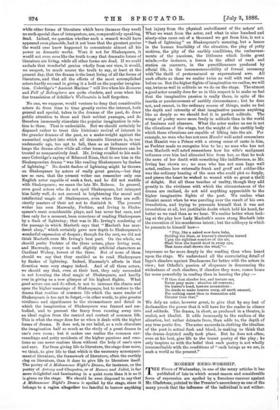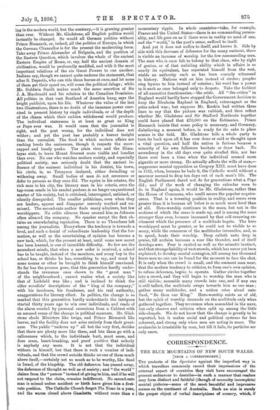MODERN HERO-WORSHIP.
rpHE Times of Wednesday, in one of the many articles it has -I- published of late in which sound reason and considerable force of expression are spoiled by a ferocious rancour against Mr. Gladstone, pointed to the Premier's ascendency as one of the many proofs that the influence of the individual is not wither- ing in the modern world, but the contrary,—it is growing greater than ever. Without Mr. Gladstone, all English politics would instantly be changed. So would all German politics without Prince Bismarck, or, indeed, all the politics of Europe, in which the German Chancellor is for the present the moderating force. Take away Prince Alexander of Bulgaria, and the position of the Eastern Question, which involves the whole of the ancient Eastern Empire of Rome, or, say, half the ancient domain of civilisation, would be profoundly modified, and with it the most important relations of the six Great Powers to one another. Italians say, though we cannot quite endorse the statement, that after S. Depretis, who can ride three horses at once, and let none of them get their speed on, will come the political deluge ; while Mr. Goldwin Smith makes much the same assertion of Sir J. A. Macdonald and his relation to the Canadian Dominion. All politics in that vast Scotland of America hang, says the bright publicist, upon his life. Whatever the value of the last two illustrations, there is no doubt of the immense power exer- cised in present history by single individuals, or of the depth of the chasm which their sudden withdrawal would produce. The individual statesman is at least as great as King or Pope ever was. It would seem that the journalist is right, and the poet wrong, for the individual does not wither ; and yet the poet has probably a keener insight than the ournalist. The flood in which modern affairs are rushing levels the eminences, though it respects the snow- capped and lonely peaks. The plain rises and the Hima- layas sink, to leave Mount Everest more visible and lonelier than ever. No one who watches modern society, and especially political society, can seriously doubt that the ancient in- fluence of the eminent individual in his district, his town, his circle, is, as Tennyson declared, either dwindling or withering away. Small bodies of men do not reverence or defer to persons as they once did. The squire in his estates, the rich man in his city, the literary man in his coterie, even the tap-room oracle in his sanded parlour, is no longer unquestioned master of his society, but is criticised, interrogated, satirised, or silently disregarded. The smaller politicians, even when they are leaders, appear and disappear scarcely marked and un- missed. The second-rate author finds many admirers, but few worshippers. No critic silences those around him as Johnson often silenced the company. No speaker except the first ob- tains an overwhelming reputation. There is no Thunderer left among the journalists. Everywhere the tendency is towards a level, and such a denial of subordinate leadership that the for- mation, as well as the ascertaining, of opinion has become a new task, which, for the present at least, until some new secret has been learned, is one of incredible difficulty. So few are the ascendant minds, that when a new order is received, a school has to be taught, instead of the monitors, and every boy in the school has, or thinks he has, something to say, and must by some means or other be brought to think himself convinced. So far has the process gone, that this generation hardly under- stands the reverence once shown to the " great man " of the neighbourhood ; cannot realise what a society like that of Lichfield was like ; and is inclined to think the older novelists' descriptions of the " king of the company," with his insolence, his frankness, and his real authority, exaggerations for literary effect. In politics, the change is so marked that this generation hardly understands the intrigues started thirty years ago to win over individuals, and reads of the alarm created by personal secessions from a Cabinet with an amused sense of the change in political manners. Mr. Glad- stone sheds Ministers like twigs, and Prince Bismarck like leaves, and the facility does not arise entirely from their great- ness. The public "reckons up " all but the very first, decides that there are plenty more like them, and lets them go with a callousness which, to the individuals hurt, must seem, and does seem, heart-breaking, and proof positive that nobody
is anybody any more. It is not that the individual withers in himself, but that there is such a number of indi- viduals, and that the crowd outside thinks no one of them much above itself,—certainly not so much as to be worthy, like Said in Israel, of the kingship. The old deference has passed away, the deference of thought as well as of society ; and " the world " claims from the " person " instead•of giving to him, and if he will not respond to the claim, remains. indifferent. No second-rate man is missed unless accident or birth have given him a first- rate position. The Catholic Church forgot Pio Nono in a year, and the waves closed above Gambetta without more than a
momentary ripple. In whole countries—take, for example, France and the United. States—there is no commanding peraon- ality, and life goes on as if there were in reality no need of one, and the " world," in the poet's sense,, sufficed to itself.
And yet it does not suffice to itself, and knows it. Side by side with this decrease of deference for the many eminent, there is visible an increase of worship for the few commanding men. The man who is once felt to belong to that class, who by right of genius, or of that unfailing ability which in affairs is so nearly its equivalent, has separated himself from the rest, wields an authority such as has been scarcely witnessed in history. Nations wait on him instead of circles ; peoples sing hymns to him instead of coteries ; his word has a power in it such as once belonged only to despots. Take the feeblest of all executive functionaries,—the critic. All " the critics " in England would hardly have stopped the Government decision to keep the Blenheim Raphael in England, extravagant as the price asked was ; but suppose Mr. Ruskin had written three lines to say that the picture was rubbish, and then reflect whether Mr. Gladstone and Sir Stafford Northcote together could have placed that £70,000 on the Estimates. Prince Bismarck insists that some policy is necessary, and Germany, disbelieving a moment before, is ready for its sake to place armies in the field. Mr. Gladstone tells a. whole party to turn its back upon all it has ever done or said or thought upon a vital question, and half the nation is furious because a minority of his own followers hesitate or draw back. No ascendency in the old days ever quite rivalled this, nor has there ever been a time when the individual seemed more gigantic or more strong. He actually affects the wills of men,— suppresses mental opposition as Gregory XIII. must have done in 1582, when, because he bade it, the Catholic world without a murmur seemed to drop ten days out of each man's life. The English Parliament dared not do for generations what a Pope did ; and if the work of changing the calendar were to do in England again, it would be Mr. Gladstone, rather than the House of Commons, who could secure the popular acquies- cence. That is a towering position in reality, and seems even greater than it is because all below is so much more level than of old. Hero-worship continues in the mass, but not in the sections of which the mass is made up, and is among the mass stronger than ever, because increased by that self-renewing ex- citement which the presence of a multitude begets. The hero worshipped must be greater, or he could not be visible to so many, while the concourse of the multitudes intensifies, and, so to speak, heats their worship. Deep calleth unto deep in praise, till acclaim becomes a roar like thunder, and of itself develops awe. Fear is excited as well as the mimetic instinct, and that strangeliability of vast crowds, which has never yet been explained, to develop mental contagion, till among ten thousand brave men no one can be found for the moment to face the shot, It is only when the crowd is small, and the eminent man near, that the modern tendency to criticise, to form one's own opinion, to refuse deference, begins to operate. Gather circles together into a crowd, and they will begin to worship the man who ie still visible ; assemble many crowds into one, and if any one is still tallest, the multitude sways towards him as one man ; gather many multitudes, and a nation cries aloud unto Saul, "Be thou our King." Hero-worship exists as of old, but the spirit of worship descends on the multitude only when gathered together. They reverence when assembled in the nave, but only observe and criticise when split up among the little side-chapels. We do not know that the change is greatly to be regretted, but it makes social and political systems far less coherent, and strong only when men are acting in mass. The avalanche is irresistible by man, but till it falls, its particles are only snow.



































 Previous page
Previous page